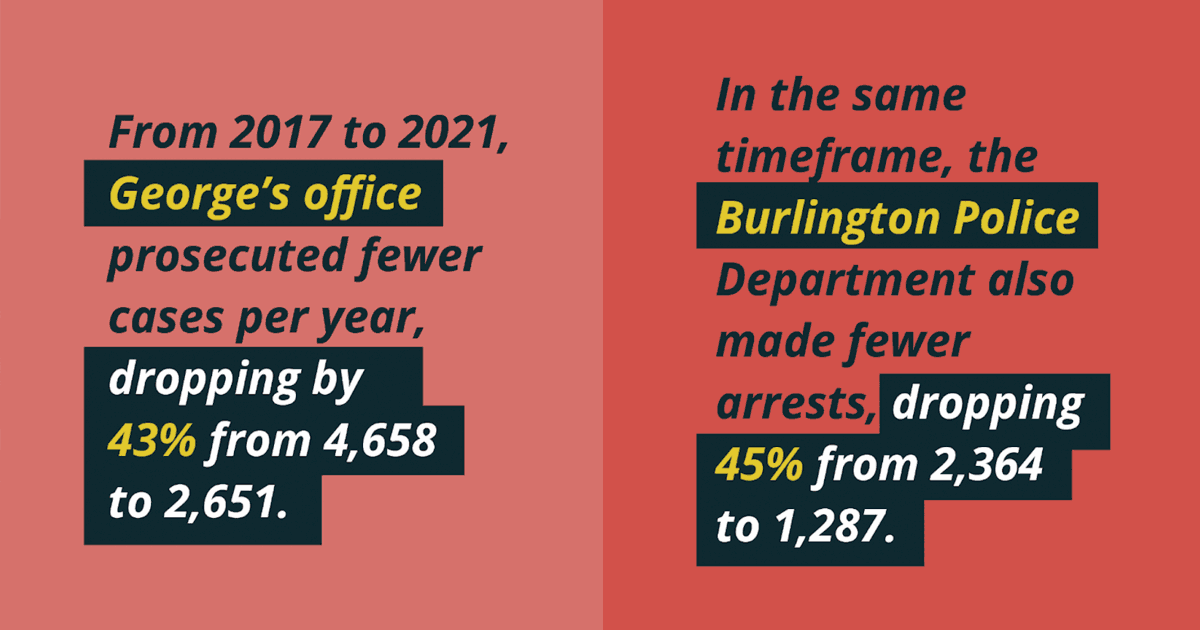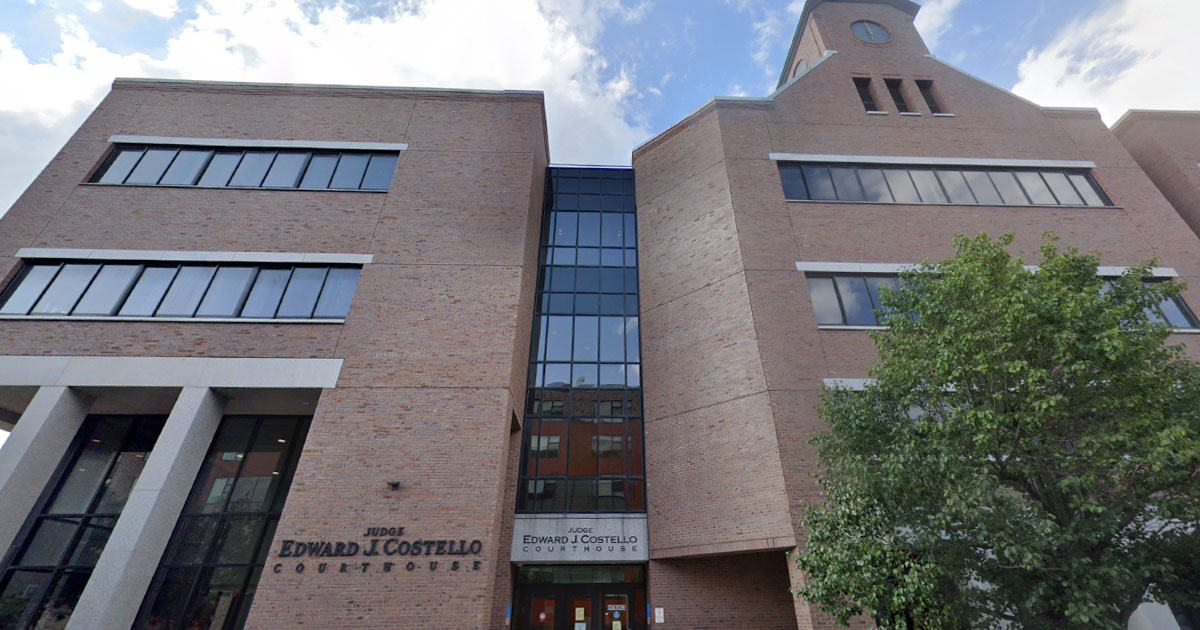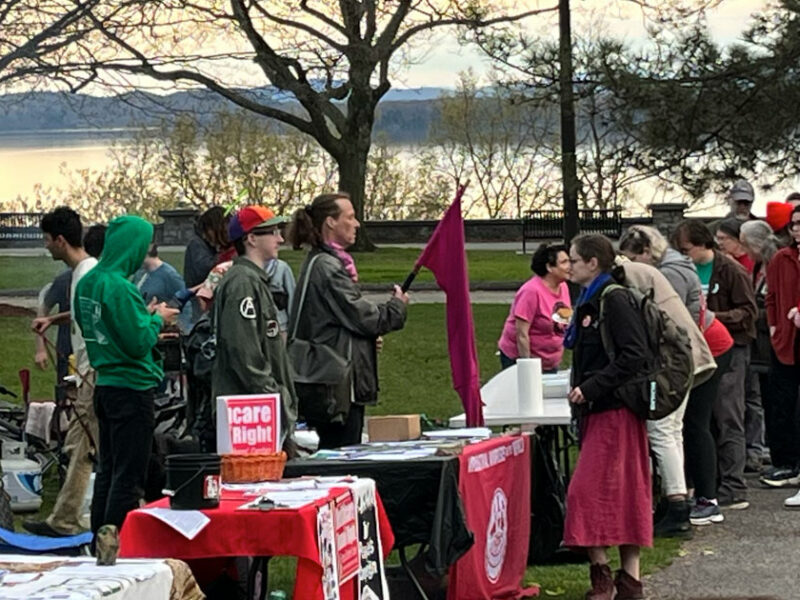Chittenden County State’s Attorney Sarah George is running for re-election, and for the first time she has an opponent in the Democratic primary. George has campaigned as a progressive prosecutor, one willing to defy local police agencies to combat racial biases and to demand reforms to Vermont’s only women’s prison, which has an assault-filled history. However, data strongly suggests that while she uses progressive language, her office is often in lockstep with local police departments, from arrests to incarceration and restorative justice.
George took office in January 2017, appointed by Governor Phil Scott to replace TJ Donovan, who had been elected Vermont Attorney General (and is now legal counsel for RoBlox). Prior to the appointment, George had worked for Donovan in the state’s attorney office for six years.
Since taking the position, her office has made nearly 14,000 individual charges.
The Rake’s record requests produced limited data from her office for the period of January 2017 to January 2022. We were given 1,700 pages of data in an uneditable PDF, and were told that this data was not available in an easily searchable spreadsheet despite the fact that it was produced from an online database with multiple search functions. For this reason, the data used in this article should not be considered perfect but should be treated as a representative overview of her office’s work under her tenure.
The Limits of Progressive Reforms
George is not afraid to speak out against systemic racism within police departments and prisons, even acknowledging that her own office plays a role. “Prosecutorial discretion is the cause of mass incarceration,” she wrote in April. “That same discretion can be used to eliminate it.”
In the last few years, George has taken this progressive reformism to heart, giving more plea deals that result in alternatives to incarceration, stopping the use of cash bail in most instances, and refusing to prosecute certain low-level offenses.
Reforms like these are not meant to dismantle the prison or policing system – a system that was built to protect capital, first by catching slaves and breaking strikes, and later by enforcing apartheid between Black and white workers. Rather, these reforms are meant to blunt some of the worst excesses of our prison system. As a result, one would expect that these prosecutorial reforms would lead to both lower charging rates and reduced racial disparities. This is not what The Rake has found.
According to their own records, the state’s attorney office does not show a noticeable difference in prosecution rates when compared to arrest rates from local police departments. Since Burlington is the only community from which arrest records are easily obtained, we are using the county’s largest municipality as a bellwether to compare. From 2017 to 2021, George’s office prosecuted fewer cases per year, dropping by 43% from 4,658 to 2,651. In the same timeframe, the Burlington Police Department also made fewer arrests, dropping 45% from 2,364 to 1,287.

This data suggests the reduction in Sarah George’s prosecutions can be explained by an almost identical drop in police arrests. A significant change in the office of state’s attorney’s charging practices would likely show a divergence in those rates, not their continuation in tandem.
It is possible that at least some of the drop in police arrests could be credited to George’s policies impacting police behavior, but evidence for such causation is not publicly available, nor is it an argument the office of the state’s attorney is itself making. Indeed, in 2018, when George released a memo that her office would not be prosecuting those arrested for possession of “addiction therapy drugs,” like buprenorphine and naxalone, the Vermont State Police released a memo of their own: those arrests would continue to be made and referred to her office.
Questions of Racial Bias in Sarah George’s Career
George has claimed her department acts as a bulwark against racial bias in police departments. However, when it comes to prosecution by race, particularly of Black community members, their numbers are similar.
A prosecutor’s job is to look at arrests, determine if they are legal arrests, and decide whether charges should be pursued based on the evidence collected by police. Data indicates that George’s office is zealous when it comes to charging Black people for crimes, while also showing less leniency when it comes to alternative carceral programs.
Black residents are disproportionately arrested by the Burlington Police Department, which has a history of ongoing racial bias, discrimination, and violence, at 3.6 times greater than their share of Burlington’s population. George’s office disproprortionately prosecutes Black residents at an even higher rate: 4.7 times greater than their share of their population in all of Chittenden County.
George’s office has the option of not prosecuting police arrests at all, and could drop charges and let people go free. Her office can also decide to send people to one of the different “alternative justice” programs through the Community Justice Center. Some critics of the program, such as those charged by George’s office for making prank calls to Burlington City Councilor Joan Shannon, have alleged that the process is punitive and coercive, embedded with its own class and racial biases.
Data from the Burlington Center for Community Justice, an alternative program in Burlington meant to divert those charged with crimes from imprisonment, suggests significant disparities between Black residents and white residents may exist when it comes to those whom the state’s attorney sends to alternative programs. However, given the paucity of publicly available data, it is difficult to determine precisely.
Beyond her office’s disproportionate impact on Black residents, she has had at least one personal controversy with racial bias and discrimination since becoming state’s attorney. In 2017, a mere eight days after taking her post, Sarah George fired Abdullah Sall, a Black African employee. The Vermont Human Rights Commission found that there were “reasonable grounds” to believe George discriminated against Sall based on his race and national origin. George fought the subsequent lawsuit and succeeded in dismissing the case; Sall did not have legal assistance when filing his suit and as a result faced multiple procedural barriers.
Supporters of Sarah George seem unable or unwilling to recognize the role that all prosecutors, and George in particular, play in perpetuating racism within the criminal justice system.
Sarah George: Prison Reformer or Abolitionist?
State’s Attorney George has spoken out against the Chittenden Regional Correctional Facility, colloquially known as the Vermont women’s prison, and is on the board of the Women’s Justice & Freedom Initiative (WJFI), whose primary goal is the closure of that prison. WJFI is an abolitionist organization that educates about and advocates for the immediate needs of all women, girls, and LGBTQ+ people impacted by the legal system.
The Vermont women’s prison, located in South Burlington, has a long history of deplorable conditions going back to at least 2012. In 2019, after stories of rampant sexual and physical abuse reached the public, George worked to commute several sentences and release several women at the prison. Yet George continues to prosecute women and send them, or at least threaten to send them, to the same abuse-filled prison she has vocally opposed.
George’s close relationship with WJFI has led to confusion and frustration among both abolitionists and her conservative detractors. Abolitionists have pointed out that to work with police officers and those directly responsible for putting people in cages gives legitimacy to the very institutions they seek to abolish.
The Burlington Firefighters Association, which has come out in favor of harsher and longer prison sentences, has labeled George an abolitionist, correlating it to the perceived increase in crime on her watch. George’s opponent, the more conservative candidate Ted Kenney, also recently called into question George’s conflicts of interest with WJFI, as she had promised to donate campaign money to their organization.
Even Progressive Reformers Bend to Political Winds
Data shows that intentions are not enough for George or other progressive carceral reformers to undo the damage our prison system inflicts on Vermonters daily. Rather than hollow out the racist and classist system of police and prisons, reforms entrench the logic and power of incarceration. Prosecutors, police, and corrections officers still hold all the power, while reformers continue to debate who deserves to be caged and who is worthy of coercive “compassion.”
Most recently, as George faces an opponent who is leading a charge against her modest reforms, George’s public comments have shown that she can and will swim with the tide when it comes to reactionary positions. In a recent press conference with Burlington Mayor Miro Weinberger and Burlington Interim Police Chief Jon Murad discussing an increase in gunshots, George tried her hand at tough-on-crime rhetoric, stating: “If somebody does commit a serious, violent crime in which we have the evidence that we need, they will be held accountable.”
Amid complaints from Burlington’s business class, George bragged to Seven Days that her office is currently prosecuting over 240 cases involving stolen property. Perhaps because our legal system exists to protect capital, The Rake has not found announcements that her office is prosecuting any cases involving stolen wages, stolen rental deposits, or illegal rent increases.
George’s tenure over the last five years shows the upper limits of reforms within the prison industrial complex. George is a darling of the progressive reform movement, yet her office reinforces systemic racism. At the first signs of an organized, reactionary pushback, George has tried to placate progressives and reactionary liberals, leading to taking “tough on crime” stances. We cannot reform a system meant to protect capital and property while controlling, caging and killing poor, BIPOC, queer, and disabled people.
Emily is a writer and organizer on the editorial collective of The Rake Vermont.



